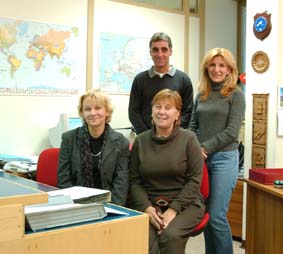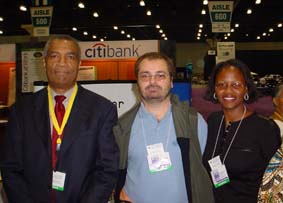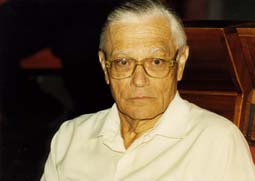Personal tools
News from ICTP 106 - Monitor

Passport and
Visa Office
The Centre's Passport and Visa Information Office is the gateway
to ICTP.
Each year, the four-person visa office processes more than 3500
visa applications.

Standing: Mauro Calligaris and Aida Foco
Sitting: Nina Dabrowski and Nora Opecca
Some visas are for our staff scientists who are planning extended
stays in Italy, often lasting several years, even decades. Some
are for individual visiting scientists who come to Trieste to
participate in ICTP research and training activities. Some are
for their accompanying family members--husbands, wives and children--who
are here because their spouse or parents are here. And some are
for travel from, not to, Italy for attendance at workshops and
conferences abroad.
These 'comings' and 'goings' put the ICTP visa office in direct
contact with consulates and embassies from more than 100 countries.
Despite similarities in the process, each consulate and each embassy
have their own set of rules and their own style of doing business.
As ICTP's visiting scientists know, regardless of where they come
from or where they are going to, governments have become much
stricter in the issuance of visas over the past two years following
the terrorist attacks of 11 September 2001. New procedures require
more detailed information and often a personal visit to the consulate
or embassy before an individual and his or her family are allowed
to come or go. A fast and simple 'ok' has become the exception,
not the rule.
As a result, it now takes much longer to process a visa. Indeed,
in some cases, visitors have been forced to cancel their visits
as a result of delays in reviewing their applications.
The new world of travel in which we all live requires both vigilance
and patience. ICTP understands governments' concerns for security
and works cooperatively with them to ensure that all regulations
are followed and fulfilled. At the same time, its close relationship
with officials both here in Italy and in many countries abroad
helps to ensure that our concerns are heard by those who are responsible
for facilitating the visa process and ensuring the safety of their
citizenry.
The process is bounded by reams of rules and regulations, yet
it is often personal at its core, both for those who are seeking
to obtain visas and those helping them to receive permission to
travel.
To effectively serve the Centre's scientists, staff members of
the ICTP visa office must operate in both the world of written
rules and the world of personal contacts. It is these twin challenges
that make the visa office, ICTP's gateway, an interesting and
rewarding place in which to work.
IAEA General Conference
The International Atomic Energy Agency's (IAEA) 47th General
Conference was held at the Agency's headquarters in Vienna on
15-19 September. This marked the first IAEA Conference attended
by ICTP director Katepalli R. Sreenivasan (left). He was accompanied
by Gallieno Denardo (right), acting director of administration,
and Brian Stewart (centre), on secondment to ICTP from the US
Department of Energy. ICTP also displayed two posters describing
the long history and broad range of current research and training
activities shared by the Agency and the Centre.
RadioNet in LA

Carlo Fonda, a member of ICTP-RadioNet (Programme of Training and System Development on Networking and Radiocommunications) at ICTP's Aeronomy and Radiopropagation Laboratory, recently spoke about the rapid dissemination of Linux software among computer users in Africa. His talk took place at a conference on technology in Africa, held in Los Angeles, on 12-14 September.
The conference was part of the Los Angeles Black Business Expo and Trade Show. ICTP has been assisting African institutions' efforts to utilise this free open-source language since 1995 (see News from ICTP, Summer 1999, p. 4-5.)
US Returns to
UNESCO
The United States has returned to the United Nations Educational,
Scientific and Cultural Organization (UNESCO) after a 19-year
absence. The official announcement marking the US return took
place at the opening session of UNESCO's 32nd General Assembly,
held at the organisation's headquarters in Paris on 29 September.
The number of member states that now belong to UNESCO stands at
190.
IN MEMORIAM

Armand Borel, a key figure in the development of late 20th century mathematics and one of the founders of the theory of algebraic groups, died on 11 August in Princeton, New Jersey, USA. He was 80 years old. Born in a French-speaking canton of Switzerland, Borel was a member of the Bourbaki Group, a group of young mathematicians studying in France whose collective explorations of new avenues of mathematical research began in the 1930s and 1940s and continue to this day. Borel's most important contributions included his insightful studies of the mathematical symmetries known as Lie groups, a central element in the study of mathematics today. Borel visited ICTP in the summer of 1996.